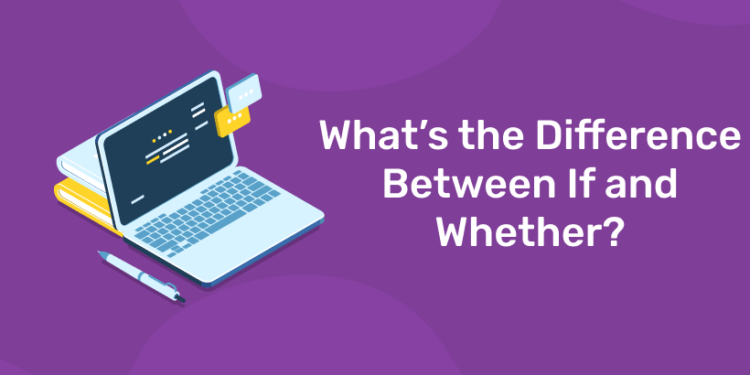Table of Contents
Key Takeaways:
- Use “if” for conditions and possibilities.
- Use “whether” for alternatives or choices.
- Prefer “whether” in formal writing and before “or not.”
- Both can introduce indirect yes/no questions, but “whether” is clearer.
- Avoid common mistakes like double “whether” or “if or not.”
Introduction: The Subtle but Powerful Difference: If vs Whether
Have you ever paused mid-sentence, wondering whether to use “if” or “whether”? You’re not alone. Even experienced English speakers sometimes stumble over this tiny but crucial distinction. Whether you’re writing an email, preparing for an exam, or simply trying to sound more confident in conversation, getting this right can make a big difference in how clearly you communicate.
In everyday English, “if” and “whether” often seem interchangeable. But dig a little deeper, and you’ll find that each word has its own unique role. Understanding when to use which can help you avoid common mistakes and boost your confidence in both spoken and written English. Let’s break it down in a way that’s easy to remember and apply.
When to Use “If” and “Whether”: Simple Rules
1: Which of the sentences below is grammatically correct?
Use “If” for Conditions
- “If” introduces a condition or possibility. It’s all about what happens if something occurs.
- Example: If it rains, we’ll stay indoors.
- Tip: Think of “if” as setting up a scenario that depends on something else.
Use “Whether” for Alternatives or Choices
- “Whether” is used when you’re talking about two or more options or possibilities.
- Example: Let me know whether you’ll come or not.
- Tip: If you see “or not” or a clear choice, “whether” is usually the right pick.
Both Can Introduce Indirect Questions
- In informal speech, both “if” and “whether” can introduce indirect yes/no questions.
- Example: She asked if/whether he was coming.
- Tip: In formal writing, “whether” is preferred for clarity.
Spoken English Course for Guaranteed Confidence and Career Growth
Spoken English Course by Entri App: Enhance your communication skills, gain certification, and boost your career with confidence.
Join Now!Quick Tips to Remember
- Use “if” for conditional sentences: If you study, you’ll pass.
- Use “whether” for choices or alternatives: I don’t know whether to go or stay.
- Use “whether” before “or not”: I don’t know whether or not he’ll attend.
- In formal writing, choose “whether” for indirect questions: Please let me know whether you agree.
- Avoid using “if” before “or not”: Incorrect: I don’t know if or not he’ll come.
| Free PDFs for download | |
Comparison Table: If vs Whether
| Usage Context | Use “If” | Use “Whether” |
|---|---|---|
| Conditional Sentences | If it rains, we’ll cancel. | Not used for conditions |
| Indirect Yes/No Questions | She asked if he was coming. | She asked whether he was coming. |
| Alternatives/Choices | Not used for choices | Tell me whether you’ll come or not. |
| Before “or not” | Avoid: if or not | whether or not |
| After Prepositions | Avoid: about if | about whether |
| Formal Writing | Less preferred | Preferred for clarity |
Common Mistakes and How to Avoid Them
- Don’t use “if” before “or not” at the end of a sentence.
- Don’t use “whether” twice in the same sentence (e.g., “whether (whether)”).
- In formal writing, always prefer “whether” when alternatives are involved.
- Don’t add “or not” if it’s unnecessary—just use “whether” for clarity.
- After prepositions, use “whether,” not “if”.
Spoken English Course for Guaranteed Confidence and Career Growth
Spoken English Course by Entri App: Enhance your communication skills, gain certification, and boost your career with confidence.
Join Now!Common Confusions with Other Words
Many learners confuse “if” and “whether” not just with each other but also with other related words. Here’s a quick clarification:
- “When” vs. “If”: Use “when” for something certain to happen, and “if” for uncertainty. Example: When I arrive, I will call you. vs. If I arrive late, don’t wait for me.
- “That” vs. “Whether”: “That” introduces a statement, not a choice or condition. Example: She said that she was coming. vs. She wondered whether it would rain.
- “Whether” vs. “Either”: “Whether” introduces alternatives; “either” refers to one or the other option specifically. Example: You can choose whether to stay or leave. vs. You can choose either option.
Knowing these distinctions can prevent confusion and improve clarity in both writing and speech.
Real-Life Usage Scenarios
Understanding grammar rules is easier when you see how they apply in real-world contexts. Here are some relatable examples:
- Business Email: “Please confirm whether you will attend the meeting.” (Formal, presenting options)
- Daily Conversation: “I don’t know if it’s going to rain today.” (Condition, uncertainty)
- Job Interview: “I’m not sure whether this is the right position for me.” (Considering alternatives)
- Texting a Friend: “Let me know if you’re free tonight.” (Condition for an action)
These examples show that “whether” often adds formality or highlights choice, whereas “if” frequently sets up a condition for something to happen. Recognizing these contexts can help you sound natural and precise.
Boost Your Spoken English with Entri
Mastering grammar is just the beginning. To truly sound confident and fluent, consider joining Entri’s Spoken English Course. This course is designed to help you speak English naturally, with real-life practice and expert guidance. Whether you’re preparing for interviews, exams, or everyday conversations, Entri’s course will give you the tools you need to succeed.
For those looking to take their communication skills even further, Entri’s Career Level-up Course offers personality development and advanced spoken English training. This course helps you build confidence, improve your presentation skills, and stand out in professional settings. Enrol now to learn and start your journey today.
Final Thoughts
Understanding the difference between “if” and “whether” is a small step that can make a big impact on your English skills. By applying these simple rules, you’ll communicate more clearly and confidently. Ready to take your spoken English to the next level? Enrol in Entri’s Spoken English Course and unlock your full potential.











